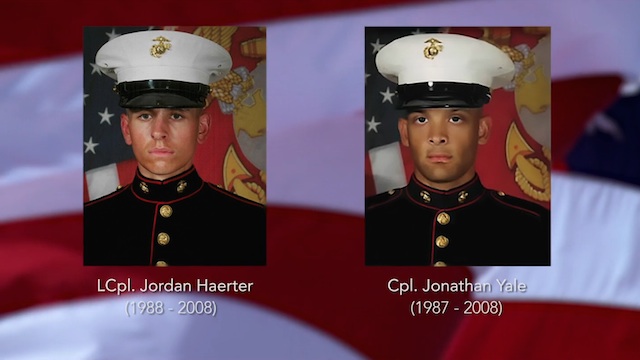On April 22, 2008, Lance Cpl. Jordan Haerter and Cpl. Jonathan Yale of the United States Marine Corps met for the first time and took their post at the entry gate of a joint security station in Ramadi, Iraq. Haerter, a 19-year-old from Sag Harbor, was just beginning his seven-month tour while Yale, a 21-year-old from Virginia, was at the end of his.
A few minutes after assuming their post, a truck carrying an estimated two tons of explosives traveled at a high speed down an alley towards the gate, Haerter and Yale, and the 150 Marines and Iraqi police within the outpost. Following orders to stop any unauthorized personnel or vehicles from passing, Haerter and Yale opened fire until the truck stopped 200 yards away and detonated. The time between the initial shots and the explosion was only six seconds.
The explosion destroyed over twenty houses, caused the collapse of a mosque, and killed both Yale and Haerter. Their sacrifice in these moments garnered national attention as well as the respect of General John Kelly, who discussed these two men and their bravery at length in a speech to the Semper Fi Society of St. Louis, Missouri in 2010.
Six years later, the story continued to live on when Joshua DeFour – a former Marine combat videographer and current graduate student in film at the University of Texas at Austin – was sent a link to Kelly’s speech. At the time, DeFour was in pre-production for another film, but needed a third film to complete his thesis.
“When I read the speech, I wasn’t even thinking about making anything, I just read it through and it hit me immediately – the courage and no hesitancy, how immediate their decision was and how selfless they had been to make that decision,” shared DeFour, who is writing, producing, and editing the film. “I reread it three or four times over the next couple of days, and I felt this responsibility almost, because I knew I could probably make a film about it.”
After some preliminary research, DeFour found that no one had made a film about this story and decided that it would be his next project – having been inspired by the fearlessness that Haerter and Yale manifested.
“I felt like if I walked away from this speech, it would feel like doing a disservice to the speech and myself, and I wouldn’t forgive myself for walking away from it,” said DeFour.
He began the process by contacting Yale and Haerter’s families and last summer, flew to Sag Harbor to meet with JoAnn Lyles, Jordan Haerter’s mother. He was able to learn more about where Haerter grew up, speak with other Marines, and take part in the inaugural “Jordan’s Run” 5K walk/run.
 |
|
Lance Cpl. Jordan Haerter and Cpl. Jonathan Yale. |
“The fact that this will be a not-for-profit film makes me very comfortable to have Joshua share their story with no agenda,” said Lyles. “He is researching carefully and making sure every detail will be correct.”
Because the film’s subject matter is that of real people and real events, authenticity and accuracy have been the two necessary ingredients in producing this docudrama.
“It was kind of heavy, a feeling of heavy weights, because I spent a lot of time reading as many articles and books to really get a sense of the ‘outside’ perspective of what happened,” explained DeFour. “But then when you deep dive and call the moms, it becomes very real, and with that comes this weight and the realization that once they gave me the green light, once they gave me their blessings, it’s ‘oh my gosh, I’m making this, this is a very real story, these were real people and it affected hundreds more people.'”
While Haerter and Yale’s stories occur within the context of war, DeFour eschews any “war film” characterizations.
“I don’t think you’d call this a typical war film. People have said, ‘Oh, you’re making a war film?’ and we say, ‘We’re making a person film, a human condition film.’ We’re not trying to put the war designation first, that is the opposite of what we’re trying to accomplish. The story is more about them than it is about the event, which is why the film is titled The 11th Order,” he explained.
For those not familiar with the Marine Corps, The 11th Order is a reference to the eleven general orders that personnel must obey when standing guard. The eleventh order is, “To be especially watchful at night and during the time for challenging, to challenge all persons on or near my post, and allow no one to pass without proper authority,” which is precisely what Haerter and Yale did.
The film is meant to capture this heroism, and bring the audience to question what they would do in such a situation. DeFour refers to a “hero complex” that we all have and believes that is what has allowed so many people to connect with this story.
“It kind of puts a mirror in front of you and calls into question who you are as a person. I think for the audience it’s a great way to both obviously have them pay respects to Jonathan and Jordan, but at the same time have the opportunity to ask themselves, ‘what would I do?'”
DeFour and those working on the film’s production estimate the costs to be $60,000. This will cover location fees at the Los Angeles set, which was also used for Iron Man and American Sniper, salaries for the cast and crew, wardrobe, stunts, lighting, camera support, and permits. Nearly $10,000 has been raised so far.
Haerter and Yale were posthumously awarded the Navy Cross for their actions, which were captured by a security camera and corroborated by Iraqi police who were present.
“You should take them as an inspiration to be that person in your everyday life,” says DeFour. “What they did embodied what every Marine would hope to give forth. We’re trained to have honor, courage, and commitment. In that situation of fight or flight, they completely embodied honor, courage, and commitment. It was such a great example of what a Marine could be and what a Marine should be.”
To donate and read more about the project, please visit www.indiegogo.com. For more information about Jordan Haertler’s story, please visit www.injordanshonor.com.






